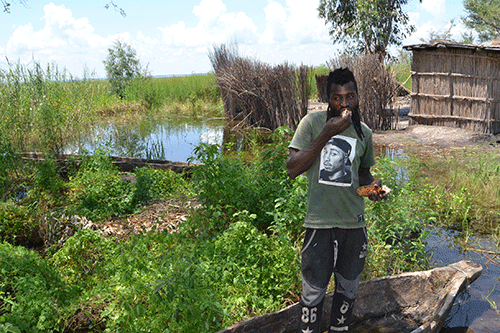KASIKA- Despite the fact that flash floods are causing misery in the Zambezi region, most residents, especially fishermen, see it as an opportunity to cash in as fish resources come in abundance.
The ongoing heavy floods in the Zambezi coincide with the lifting of the fishing moratorium a week ago.
The official fishing season opened on 1 March 2023 after closing on 1 December 2022 to allow stocks a chance to recover, and for breeding to take place uninterrupted.
The lifting of the fishing ban means residents can now fish until the season again closes at the end of December this year.
The closure of the fishing season has
been felt even more by fish vendors at the Katima Mulilo open market, where local women were unable to get the stock to cook for their customers.
The Zambezi region alone has at least 75 species of freshwater fish, including three types of bream, catfish, barbel, and the most sought-after but elusive of all, the tiger fish.
On 1 March, most fishermen rushed to the river and into the Kabbe floodplain areas to set up their fish nets to capitalise on the fishing season.
Fishermen from all over the world also
visit due to the quality of the fish species on offer.
New Era caught up with fisherman
Kamwi Nchindo from the Mapate village in the flooded Kasika area, where he was found enjoying his first catfish catch, roasted.
Although Nchindo’s family house has
been surrounded by flood water, this challenge did not stop him from catching fish.
“We vacated our homes due to floods. As you can see, our house is under water. We went to seek refuge from our family
members on higher ground in Mbalasinte. However, I often come back and check up on our house. Since the fishing season is open now, I also come and catch fish here
for eating, while I sell some of it,” he said
while seated in a dugout canoe and eating catfish.
A University of Namibia (Unam)
student at the Katima Mulilo campus, who preferred not to give his name, expressed his excitement over the open fishing season.
“We are happy that the fishing season is now open. We have been suffering since the season closed in December last year. We could not catch fish, which is our livelihood. We are very happy because we will be able to fish and sell to make a living, and
support ourselves and our family
members,” he added while preparing his
bait on the banks of the Zambezi River.
Some fishermen use maggots and snails as their fishing bait.
Asked why they don’t want to be permanently relocated, Nchindo said it is not good to leave their homes.
‘We don’t want a permanent relocation. We prefer leaving our homes temporarily, and coming back home when the water subsides. This is the only place we ever knew and call home. We have plenty of fish here for consumption, and we also sell to make a living to tackle the high unemployment in our areas,” he reasoned.
Zambezi governor Lawrence Sampofu cautioned residents, especially fishermen, to take precautions when conducting f
ishing excursions.
“Our people know there are hippos, crocodiles and snakes in the water, so they should take caution as we do not want to lose any lives. I also urge our people not to use mosquito nets, but rather the permitted fishing nets. They should likewise have
fishing permits from the fisheries ministry and constituency offices,” he cautioned.
Sampofu furthermore appealed to Zambezi residents not to use foreigners to fish in Namibian waters, as the season is meant for locals, provided one has a valid fishing permit.
Sadly, unsustainable fishing methods being used by illegal fishermen at Lake Liambezi at Miyako as well as at Manyonga Lake at Malindi on the fish-rich belt covering inland lakes and water bodies at Luhonono, Namiyundu, Nankutwe, Muzii and the surrounding areas, have been observed over the years.
–anakale@nepc.com.na



